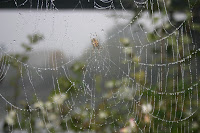 s ever an appropriate time to discuss Tarot cards (some would say there is not), when better than Halloween? Tonight is the night for witches and goblins, a fitting time to think about the 'other' side *appropriate music*.
s ever an appropriate time to discuss Tarot cards (some would say there is not), when better than Halloween? Tonight is the night for witches and goblins, a fitting time to think about the 'other' side *appropriate music*.Samhain is the Celtic name for All Hallow's Eve. It represents the ending of the light time of the year and the beginning of the dark. Some see it as when the dead reach out for the living hence scary movies and the costumes that used to be most typical for Halloween-- witches, ghosts, and monsters. Today I hear Hillary Clinton is the most popular scary mask, not sure if that has meaning but will save politics for another day.

On Samhain, All Hallow's Eve, Halloween, the veil between the other side and the living is supposedly very thin. Some believe it's a day to celebrate those who have gone on. To do this, they create an altar of pictures and keepsakes to honor their loved ones who have died. It is traditional to use lights and food to guide the spirits back and as offerings to them. The gifts of candy for children goes with this tradition as does a switched on porch light meaning -- come on in.
Last we
 ek I had been in Portland and visiting my favorite metaphysical bookstore, New Renaissance, when I remembered my desire for a new Tarot deck. I had been using the traditional Rider-Waite decks. Now I wanted something different.
ek I had been in Portland and visiting my favorite metaphysical bookstore, New Renaissance, when I remembered my desire for a new Tarot deck. I had been using the traditional Rider-Waite decks. Now I wanted something different.It was probably about eight years ago that I got my first deck. I use them now and then but not daily. I won't go into the details of how to read cards because I think I wrote about this before. T
 his is about my new deck.
his is about my new deck.In the bookstore, I looked through the sample cards but as soon as I saw The Gilded Tarot, I knew it was the one. The art is digitally created by Ciro Marchetti. The companion book with suggested meanings and spreads was written by Barbara Moore. The art really touched me which is the best way to select a deck. I liked that it use
 d the traditional structure I had learned. The illustrations spoke to me on an artistic and emotional level. They seemed like a fantasy novel as the stories on each of them added subtle nuances to the meanings of the cards.
d the traditional structure I had learned. The illustrations spoke to me on an artistic and emotional level. They seemed like a fantasy novel as the stories on each of them added subtle nuances to the meanings of the cards.So far the readings I have done with this deck, after smudging it to cleanse it with sage, have been intuitive, giving me not just insights but reassurances about the direction I have been moving.
An example-- I posed a question about my relationship with another person, shuffled, cut and dealt out 3 cards. Looking at them, they seemed very apropos from what I knew of the situation.
I turned the question toward the other person's end of the relationship, shuffled, cut and deal
 t them again. In both readings, I received two of the same cards (what are the odds of that with 78 cards?) In each reading, the third card was different-- accurately showing the problem from two different perspectives, helping me to see how the other person was seeing it and what my end of this should be as the two similar cards represented the goals I already had come to believe.
t them again. In both readings, I received two of the same cards (what are the odds of that with 78 cards?) In each reading, the third card was different-- accurately showing the problem from two different perspectives, helping me to see how the other person was seeing it and what my end of this should be as the two similar cards represented the goals I already had come to believe.If you do a reading, where you already knew what it says, what was the point? I think it's two-fold. One is it helps us to realize our insights are accurate. It gives us confidence in our own intuition. Then if one believes there is spiritual help from outside ourselves (always ask that you receive help only from the good side, from the white light, from your understanding of who god is), readings that succeed are confirming that the help is out there. These readings also have reassured me that this deck is working for me right now. It is the right deck at the right time.
Personally, I don't believe Tarot is occult but realize some see it that way. In my mind, it is a tool. How it is used will determine whether it's for good or ill which is true of any spiritual tool including rosaries, prayer beads, even scriptures when they are used to prophecy.
 Trick or Treat!
Trick or Treat!Hey, it's supposed to look scary :)















































